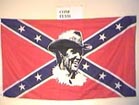Question 1: What region were you raised in? (Can be a general region or specific state or city, etc)Outside the US.
Question 2: What region do you live in now?Las Vegas, NV.
Question 3: What was your first exposure to the Confederate flag?Can't remember...way back, on TV and in books and so on.
Question 3.5: What is your perception of the Confederate flag?When I first came to the US I spent a bit of time traveling through the South, and when I was in Plains, GA, I bought a little confederate (battle) flag as a souvenir. I stuck it on the outside of the little car I was in at the time, traveling for that time with an American dude I knew from overseas, and called it a 'Confederate staff car' (I was 20 years old and the irony of representing a long since lost and dead cause seemed interesting). The dude with me pointed out that perhaps I should stow the flag, and that it was not liable to endear us to any locals of African heritage. The thought of that quite literally did not even begin to occur to me, though when he pointed that out I realized the link.
Where I was born and raised, the Confederate flag was exclusively a symbol of rebellion...you know, the idealized James Dean and Elvis kind, usually tied in with one of those pop icons or someone similar or linked to the kind of southern rock that was produced by southerners who were definitely not paleolithic racists. Its appearance on the General Lee, in
The Dukes of Hazzard, only compounded the idea that the flag was by then relegated to the role of prop for harmless fantasies of generalized rebellion, the kind associated with people like the Dukes 'sticking it to the Man.' In fact, someone even gave me a patch that had a representation of Elvis' head superimposed on the flag, and I've seen the same for James Dean (who wasn't even southern) and others. Now, working on the Las Vegas Strip, I see a lot of confederate flags as tattoos or adornments on clothing worn by people from Europe and japan, especially, most abundantly among the many ardent rockabilly fans I encounter here. I suspect these people have a perception of the battle flag that's like my original one. And, really, such symbols only have the power that we accord them and, at least overseas, that flag does not generally seem to be a racist symbol but a symbol of that general sense of rebellion (never mind that, usually, it's all played for mere effect and there's not much real rebellion going on).
So, yeah, my initial view of the flag was pretty much one of cluelessness. And this was on the heels of my studying American history, with a further course of study of black American history, in university in my home country. I understood a great deal about the USA, pretty much understood its structure and history, but the whole Confederate flag thing eluded me...just never crossed my radar screen. On top of that, it's a fairly striking and attractive design that's aesthetically appealing regardless of its history.
That little epiphany in Georgia 23 years ago stuck, though. As fate would have it, I was living in that great state during the debate over the State flag, and its transition to the new design, and I was one who thought perhaps they should just leave the battle flag on there for the sake of history UNTIL I learned that it was only added in 1956 as a transparent response to Federal desegregation efforts. Again, it's the intent of the representation of the flag, not the mere fact of it, that I think is important. I'm glad they changed that state's flag, because what I thought was an artefact of history turned out to be a symbol of hate and divisiveness.
These days I tend to remain a little open-minded about the flag popping up here and there. People from other countries, and even people from places like the West coast and similarly removed areas, aren't necessarily ardent racists for showing the flag in some way or another. The Harley posers I see who have the flag emblazoned on their silly little 'helmets' or on those leather vests may or may not be racists (in my experience, many are -- more likely to be terrible misogynists, though -- but for some I suspect it's just an element of their poserness). And I'm sure that some (the Duke Effect...Luke and Bo, not David) use it as a symbol of pride in their southern heritage or in their benign redneckiness, with no overt racist message intended. In general, though, I see the Confederate battle flag as a symbol of intolerance and hatred, mostly racial hatred, and I tend to think the worst of drivers of trucks and so on that have the flag as a sticker or flying from the antenna. By now, it seems that most Americans should have caught at least a whiff of the controversies over the flag as a component of state flags, so I think the odds are decent that those who fly them these days do so either because they pride themselves on being obnoxious or because they're racist scum. Again, though, I've seen too many exceptions to this -- myself included -- to totally rule out giving the offender the benefit of the doubt.
Basically, I see the battle flag as a sad thing: an honorable symbol (and, yes, though the Confederacy were essentially the bad guys as history proves out, the men who fought and died under this flag cannot be considered evil) that was co-opted by the Klan and other hate groups and is now, like it or not, entrenched as a symbol of racial and other intolerance and hate.




